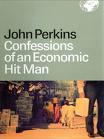 Confessions of an Economic Hit Man by John Perkins
Confessions of an Economic Hit Man by John Perkins
 Confessions of an Economic Hit Man by John Perkins
Confessions of an Economic Hit Man by John Perkins
How do you rise up against a system that appears to provide you with your home and car, food and clothes, electricity and health care -- even when you know that the system also creates a world where twenty-four thousand people starve to death each day1 and millions more hate you, or at least hate the policies made by representatives you elected? How do you muster the courage to step out of line and challenge concepts you and your neighbors have always accepted as gospel, even when you suspect that the system is ready to self-destruct? Slowly, I stood up and headed back to the house to pour myself another cup of coffee.
While Perkins may excel as a corporate puppet, he fails to write well (witness the full-brakes ending to the above paragraph). Given the lack of literary intelligence, it seems unlikely that he recognized the satire hidden in his badly concatenated words.
After gallavanting around the globe, "taking advantage" of countless people, and making scads of cash, Perkins feels contrite.2 He shouldn't have made that money, or bought that house (coffee included). So we shouldn't want the same things. Fine. This is standard "I'm a reformed-ing hypocrite" fare. The slapstick satire comes from the parallel between his desire for material success and his constant failure to recognize that maybe (just maybe), other people might also want "the life".
Putting the humor aside, Perkins just asks the wrong questions. The problem isn't prosperity; it's poverty, war, and plague. How can we get from the world of today3 to a world that minimizes those Three Evils. The only known solutions for war are 1) hegemony and 2) most people having something too important to risk losing. Choosing option 2, we solve the poverty problem as well, when the valuable thing = material goods with a foreseeably good future for your kids. In order to get there though, a bunch of people have to be fork-lifted out of poverty by massive growth. Can we make the fork-lift procedure more pareto-optimal-ish?
Good question. Too bad Perkins isn't asking it.
Choosing Nationalism over Internationalism = Fail
In Chapter 6, "My Role as Inquisitor", Perkins relates that Bahasa Indonesia was a 20th century invention.
Instead of unifying under a regional lingua franca like one of the flavors of Chinese or English, Sukarno
chose to unify under a form of Malay. Perhaps politically expedient, but not helpful to his country in terms of reducing isolation.
1 -- Death = the default option
After surviving birth, unless someone takes care of us, unless we learn to feed ourselves, unless we learn to
avoid big predators, we die. In order to stay alive, we have to work a bit. In that light, 24K/6B people looks like a deal
compared to the probable daily death rates of earlier times.
2 -- cue Nicaragua by Screeching Weasel.
3 -- The Malthusian fear that we can't sustain a good life for 6B people doesn't imply that we shouldn't try.